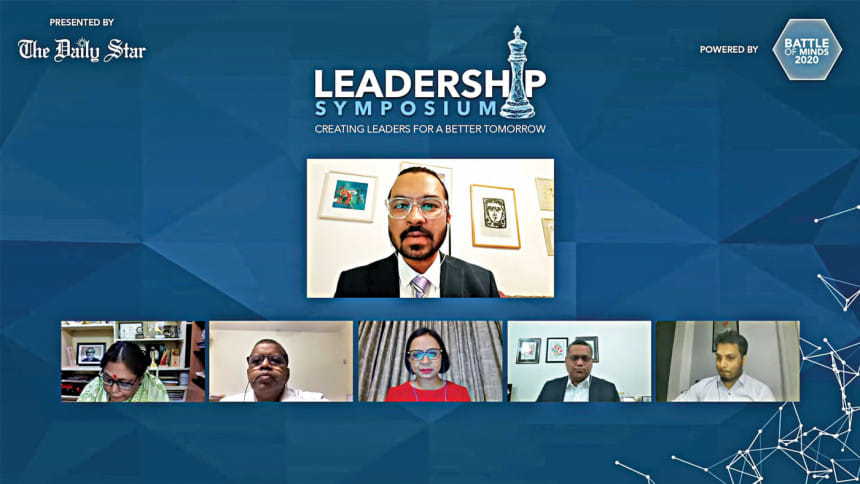A Foray into Education, Youth and A Better Future

Leadership Symposium powered by Battle of Minds 2020 and presented by The Daily Star was an online event where a panel of experts from backgrounds in academia, the corporate sector, government and youth engagement came together to deliver an hour of fruitful discussion with the aim of reflecting, exploring and examining the role of education in creating leaders for a better tomorrow.
The symposium was conducted by Zunaed Rabbani, in the presence of Dr. Farzana Islam, Vice Chancellor, Jahangirnagar University (JU); Mominur Rashid Amin, Additional Secretary, Ministry of Education; Rumana Rahman, Regional Head of Human Resources, Asia-Pacific and Middle East, British American Tobacco (BAT); Shehzad Munim, Managing Director, British American Tobacco Bangladesh (BATB); and Osama Bin Noor, co-founder of Youth Opportunities, an award-winning global platform aimed at empowering the youth.
The discussions started with the history of local leadership in the corporate sector of Bangladesh. Shehzad Munim of BATB had profound reflections on the issue having had a first row seat to the ascension of local corporate talent from functional heads in companies to the head, or the position of CEO. With a mention of his organisation's role in not only fulfilling their own needs of local talent but also providing talent abroad, he stressed on the need to ensure an uninterrupted sequence of qualified individuals to occupy leadership positions in the future.
Rumana Rahman, a bright example of local talent making a mark globally, shared experiences of her own in this regard. With a gleam of pride, she counted off many other examples of individuals in key positions of the multinational company she is a part of. She shared her personal ambition of seeing a brand of competence and reliability created by Bangladeshi professionals working all over the world.
Youth Opportunities works with young talent, aiming to empower the youth by bringing closer opportunity providers to the seekers. A co-founder at this organisation, Osama Bin Noor is ideally poised to observe the needs of the local youth. His remarks circled in around the need to provide more inspiration to the youth. He focused on the crisis of role models and mentorship, the lack of proper career guidelines for students in Bangladesh. The need to involve the youth in developing education policies, the need to decentralise opportunities in Dhaka to the rest of the country, and the need to align the necessary 21st century skill set to institutional education are also issues that were brought up.
Dr. Farzana Islam was requested at this point to weigh in on what universities have been doing to increase the employability of students in a world where unemployment, or alternatively, underemployment, is a big issue. She asked the panelists to look at the youth not as a homogenous group, but as the diverse group of different abilities and necessities that they are. She talked about the various problems she has observed among her students and the barriers that these problems create in their education and employability. She stressed on the need of government help to pull up the standards of education in a country such as ours where poverty is common. She argued for the need of philanthropic contributions that help foreign universities raise their standards, but aren't prevalent in universities here.
Asked about what the Ministry of Education has planned for the future in terms of the shifting necessities of a country whose goals have shifted with the elevation from a low income economy to a middle income economy, Mominur Rashid Amin talked about the importance of cashing in on the demographic dividend of a majority youth population that Bangladesh currently enjoys. He talked about the updates made to the education policies, the importance of technical education, and the need to create a competent labour force that can fulfil the needs both at home and abroad. The government's efforts to create more vocational and technical training centres, of establishing universities in every district were mentioned as well. He talked about the existing efforts to extend urban opportunities to rural areas and how this will come back to help make the most of the aforementioned demographic dividend in our population.
The discussions continued further, with examination of what various companies have done to attract top talents, how they've held onto such talent, and what companies can do to create a seamless transition from academics to professional life. Opportunities created for the youth, and the need to extend these opportunities to all parts of society came back into the discussion once again, as it was deemed an important issue that has to be resolved if progress was to be had. The accessibility of quality tertiary education was reflected upon, and the possibilities of public private partnerships in talent development was also explored.
The symposium came to an end with the message of the revolutionary change that is needed to reform education to bring it into sync with the future, and to create leaders for a better tomorrow.

 For all latest news, follow The Daily Star's Google News channel.
For all latest news, follow The Daily Star's Google News channel. 



Comments